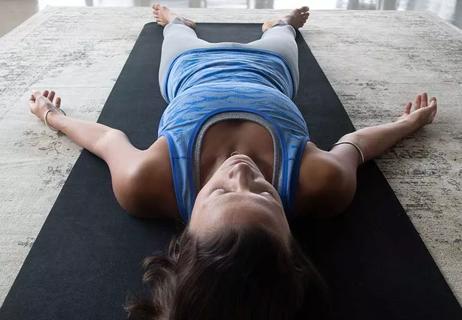Breathing, exercise, mindfulness and more can help you unwind and step away from your stress
Life can be stressful, and there’s a good chance that “relaxation” isn’t blocked off on your calendar — even if it should be.
Advertisement
Cleveland Clinic is a non-profit academic medical center. Advertising on our site helps support our mission. We do not endorse non-Cleveland Clinic products or services. Policy
“We need to think of relaxing not as a stopping point, but as a necessary pause,” says psychologist Susan Albers, PsyD.
But most of us were never taught how to relax. And too much time running endlessly on life’s hamster wheel may have you wondering where to start and what relaxation techniques to try.
Dr. Albers is here to help.

Image content: This image is available to view online.
View image online (https://assets.clevelandclinic.org/transform/0b02b8bc-b649-4756-b026-45fb6086736d/how-to-relax-infographic)
Relaxation can look different depending on your needs and what works best for you. These seven techniques can help you lower stress, ease anxiety and care for your mental health.
When you’re wound up, it messes with your breathing. You might breathe too quickly or breathe shallowly. Either way, it can keep your body and mind revved up and on edge.
Focusing on your breath is a sure way to relax and release tension quickly.
Dr. Albers suggests a technique called squeegee breath:
Other breathwork exercises to try include five-finger breathing, box breathing and holotropic breathing.
Advertisement
To relax, you should get moving. Yes, that sounds counterintuitive — but here’s why it works.
Exercise encourages your body to produce endorphins, feel-good chemicals that help you mellow out (not to mention all the other benefits of exercise).
If you’re up for a sweat session, going for a run or doing high-intensity interval training (HIIT) can do the job. But your workout doesn’t have to be grueling to get the endorphins pumping. Try swimming, walking and simple calisthenics, like squats, lunges or burpees.
Finding it tough to get the motivation to exercise? Take a cue from “joyful movement” and seek out active fun, like dancing, roller skating or joining a sports team.
When life is hectic, it can be easy to switch to autopilot and try to just grind through your day. But that can mean missing out on the beauty of the present.
“Mindfulness is like engaged relaxation,” Dr. Albers explains. “When you can be fully immersed in the present — rather than worried about the future or stuck in the past — you can better come to peace with what’s happening around you and inside of you.”
The result? Big-time relaxation.
Meditation is one way to do mindfulness. Sitting still with your thoughts (without judging them!) can help you stay present and grounded.
And no, meditating doesn’t have to mean sitting crossed-legged and alone for hours. There are lots of ways to meditate, and you can practice for as long or as short a time as you need. Try progressive muscle relaxation or guided imagery.
Getting out in nature and touching grass (literally or figuratively) can be a game-changer for your well-being. Feel the sun on your face. Enjoy the wind in your hair. Breathe in that sweet, sweet outside air.
“Just walking away from your computer, your phone and your to-do list can be relaxing,” Dr. Albers says. “A change of scenery can help to take you out of those stressful moments and gain some perspective.”
Sure, a trip to the beach can do the trick, but so can simply spending some time on your patio or taking a walk down the street. Looking for a more immersive experience in the great outdoors? Forest bathing might be for you.
If bed-rotting, binge-watching and doomscrolling are your go-to relaxation techniques, it’s time to question whether they’re really doing you any favors.
Too much mindless time watching other people live their lives isn’t as relaxing as it might seem. You can start comparing your life to theirs, and convince yourself that yours doesn’t stack up.
Advertisement
Instead, put down the remote, step away from your phone and spend some quality time doing something you enjoy. For some people, that might mean:
“It’s not about what you do with your time. It’s how it makes you feel and whether it allows you to put down your worries and let the stress go,” Dr. Albers notes.
Your hobbies are all about doing what you want to do.
Truly caring for yourself isn’t just about pampering. It’s about meeting your most basic needs, like:
“Real self-care isn’t just this grand thing you do every so often when you desperately need some me-time,” Dr. Albers reminds us. “It’s about keeping yourself a priority, which can lower your stress and help you to relax.”
Integrative medicine therapies can help you relax, while improving your health and wellness. That includes practices like:
Advertisement
Relaxing has enormous benefits that span both your physical and mental health. Specifically, practicing relaxation techniques regularly may lead to:
“Relaxation is like shifting into a lower gear and cruising for a while, letting your body regenerate and recover,” Dr. Albers illustrates.
Getting more relaxation sounds blissful. But in reality, it can be a tough transition.
“Our culture focuses on go-go-go. The world around us tells us we should constantly be doing something,” says Dr. Albers. “As a result, downtime can feel foreign or uncomfortable.”
Here are some things to remember when working relaxation into your life:
Advertisement
And above all, remember that relaxing is important and well worth your effort.
“You can often tell when somebody has been stressed over a long period of time. They look worn down. They can have more illnesses or colds,” Dr. Albers says. “Relaxation leads to more strength and resilience.” And we could all use more of that.

Sign up for our Health Essentials emails for expert guidance on nutrition, fitness, sleep, skin care and more.
Learn more about our editorial process.
Advertisement

From breath meditation to yoga nidra, all types of meditation aim to help you feel calmer, more relaxed and present

Sensory deprivation therapy can help relieve stress, improve sleep and decrease physical pain

You don’t need to have years of experience to reap the rewards of meditation — with benefits for your whole body, you only need a couple minutes to get started

While walking, be mindful of your body, your mind, your place in the world and all five of your senses as you pave a path forward, one step at a time

Thunder, waterfalls and heavy rain — these low-frequency sounds might help cancel out disruptive noises and thoughts

Immersing yourself in nature can improve both your mental and physical health

This bedtime exercise can help you fall asleep faster (and stay asleep)

Use this technique to increase awareness of your body and assess how you’re feeling

Even small moments of time outdoors can help reduce stress, boost mood and restore a sense of calm

A correct prescription helps your eyes see clearly — but as natural changes occur, you may need stronger or different eyeglasses

Both are medical emergencies, but they are very distinct events with different causes